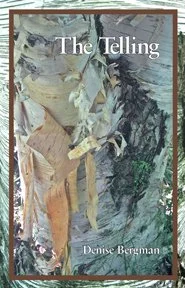THE TELLING
The Telling, a book-length poem, investigates the life-long secret of a woman who believed that as a child fleeing repression, she accidentally killed her mother.
Denise Bergman's second collection of poems is astonishingly original: I can't think of another work that uses something so small to such large effect. The Telling is ultimately about time and memory, art and truth, women and birth and death, and it all comes from "A sepia memory / mildewed, perhaps, or not"—a tiny center around which Bergman's lyrical intelligence moves with haunting power and grace.
—Martha Collins
As scribe to the recounting of a few harrowing childhood hours that would shape her grandmother's life, Denise Bergman examines trauma, suppression, and how the honest mind must sometimes alter truth. This, then, is no simple compassion; as the narrator bears witness to the recounting of a monumental and guilt-laden secret, Bergman searches underneath the told story. In her spare, halting lines and the wide silences between them, one senses a tender and horrified listening, and in this listening an implied counterpoint, a murmur of truths unspeakable. Every object in The Telling has a vulnerable, culpable animus. All are witnesses. Bergman's testimony acknowledges the heartbreaking necessity of amnesia.
—Frannie Lindsay
Read an interview about The Telling for the Next Big Thing
THE TELLING
Matchstick thin a girl
with a jug too burning hot to hold
stumbles
and the field of berries holds its blue breath
as she and the jug
fall soundless
on the shoulderwide path of matted-down
footsteps.
Cracked, cracked to pieces
the jug
flashes its boiled water
over her mother
who had stifled the wail of birthing
muffled the first squawks
first chirps of rose-pink life,
now this
now this
her mother scalded to death.
A girl
and a wet wrinkled baby.
No milk
no movement, nothing.
·
That was the telling,
my grandmother fleeing.
A sepia memory
mildewed, perhaps, or not
the telling, as if a coin lifted from a box at the back
of the bottommost drawer in the darkest
most airless corner of the shadedrawn room
her telling
told to no one but me
and that time only
as she pulled two blueberry muffins
from the bakery bag
and set them and a knife on the plate.
·
A memory, over and not
like the song about the song
that never ends.
·
A girl, not here, not there,
stopped in what becomes forever
dead center
and fuels the nights of her sleep.
·
Had I known, I could have told her
no one dies from a jug
of boiled water.
Published in Solstice, 2012
